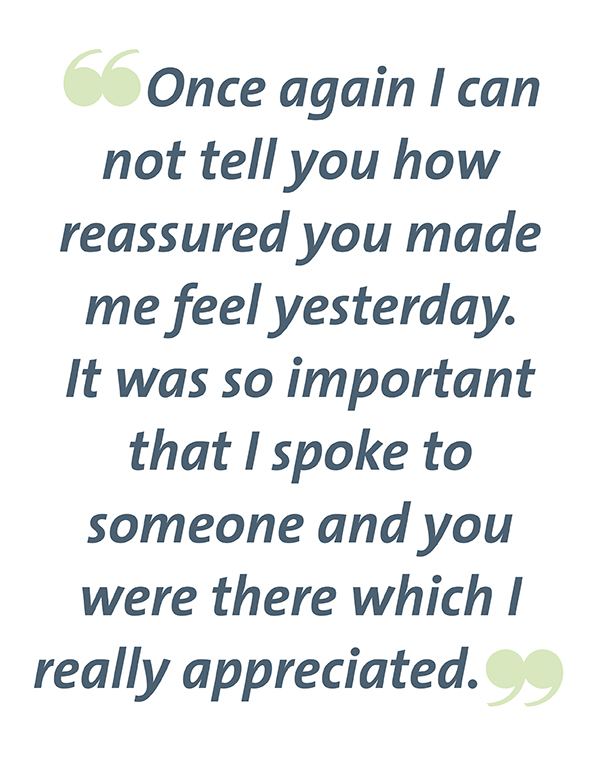Acceptance
Acceptance helps us to make peace with the difficulties that come with life and what is out of our control, whilst at the same time committing to action that will improve our quality of life.
How will acceptance help me to live better with a brain tumour?
Life brings both joy and pain. Learning to accept things as they are without evaluation or attempts to change them can bring freedom. It is about living with painful and negative thoughts and feelings, understanding that they are part of the challenges we are facing, and not being overwhelmed by them to the extent that we become trapped and unable to move forward in our lives.

Accepting that you are fatigued can allow you to move forward, whereas obsessively and unhappily playing things over and over in your mind keeps you stuck. For example, if you are frustrated and angry because you can’t do the things you used to do, your frustration and anger become the focus, draining energy that could be used more positively.
Accepting the reality of your fatigue and working with what you have now, living in the present rather than constantly asking “why?” about the past, reduces helplessness and despair. It can open your eyes to new opportunities, new ways of doing things, new hobbies, new forms of exercise.
Acceptance means allowing the painful feelings and sensations to come and go as part of the natural process of loss, while dropping the fight against them. By giving the feelings permission to exist in the present moment, but not getting caught up in them and dragged back to the past, it is easier for your feelings to come and go without you becoming stuck within them.
So we are neither bottling up our negative feelings (this is toxic positivity, and does far more damage than good), nor are we obsessing over them and denying ourselves the chance to cope as best as we can. In doing this, over time, these negative emotions lose their impact on your everyday psychological and emotional well-being.
brainstrust can provide counselling to help you. Click here for more.
How do I learn acceptance?
A useful metaphor is to imagine life as a sailing boat1.
During your life, you have picked up the skills necessary to sail your boat and you have a sense of where you are heading.
At some point in your learning to sail, you have learned that from time to time, waves may wash over the bow and you will find yourself with wet feet. The usual response in this case is: When you’ve water around your feet, use a bailer to bail out the water.
At different points in your journey, waves hit and put water in the bottom of your boat, so you use your bailer to get rid of the water.
You have been using your bailer a lot, sometimes bailing quickly, sometimes bailing carefully, sometimes bailing wildly, sometimes bailing desperately.
In all this time spent using the bailer, you realsie that you have never been able to get rid of all the water. And all this time that you have been bailing, what has been happening to the direction and progress your boat has been making?
Is it fair to say that you have been bailing more than you have been sailing this boat?
Now – what if you were to one day really look at the bailer and to see that it was full of holes? What would you have to do first? You’d have to find a different bailer, one that is more effective. It may be that you have already tried different bailers and none of them are effective anymore.
So – you need to develop a different approach. This approach is about accepting that there will always be water in your boat, and the best thing to do is get the boat moving in whatever direction you choose.
Once you get the boat moving, then you might be able to investigate some other ways of bailing; if they prove to be useful strategies in helping you to take this boat where you want it to go.
The question to ask yourself is this: Which would you choose?
- To have this boat with only a little water in the bottom, but the boat is drifting because you are bailing so much and you do not have the capacity to look up to steer the boat. In other words, you are not choosing the direction you sail.
or
- The boat has water in the bottom, maybe sometimes so much water that you wonder how it is still afloat, but you are taking this boat, however slowly, in the direction that you would most want to take it.
If you feel unable to adjust to the consequences of having a brain tumour to a point where it is significantly impacting your day to day life you may want to think about accessing professional support, through brainstrust or your GP. Get in touch to find out how we can help.









